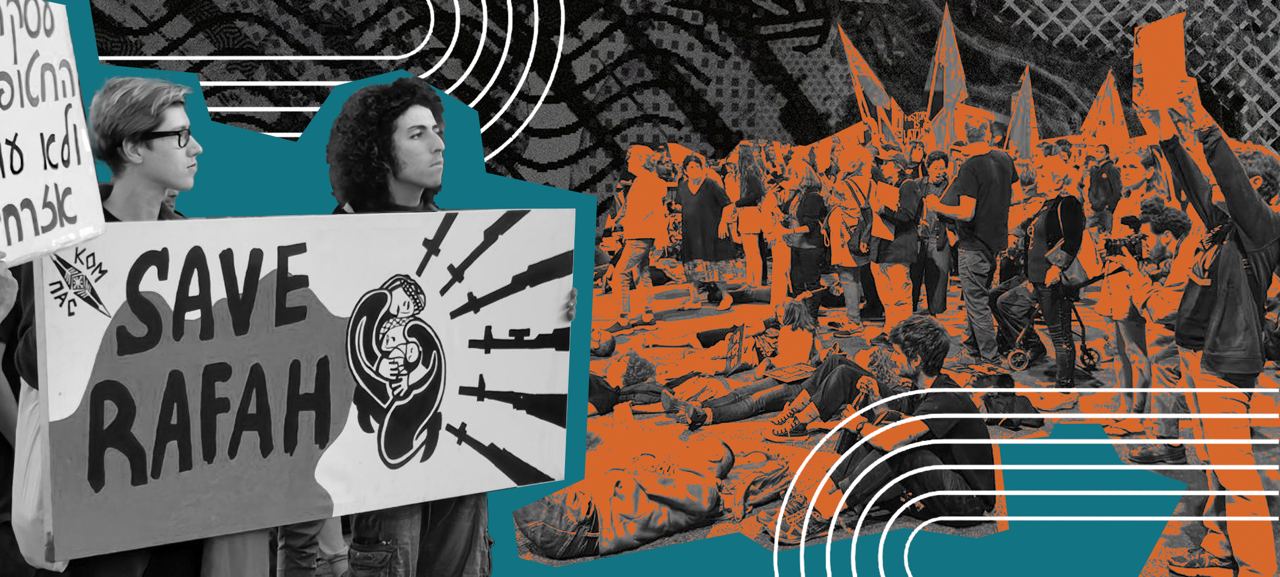It is the twelfth month since the war between Israel and HAMAS began. So does the ongoing encroachment (demolitions, killings, and evictions of Palestinians from their homes) in the West Bank. Some Israelis are also aware of the situation and are trying to prevent further crimes by spreading information and by being present in the occupied territories; by their bodies. One of these Israelis is Roman Levin from Zaporizhzhia, who is a co-founder of the Compass, a civil society organisation for human rights in Israel and Palestine. More than one and a half million Russian-speaking people live in Israel, and until 2022, the vast majority of emigrants (repatriates) from Ukraine were among them. Compass works primarily with such an audience, as there is almost no information in Russian about Israel's crimes against Palestinians.
Tell us a little about yourself. How did you end up in Israel, where did you study? Aside from Compass, what do you do?
I was born in Zaporizhzhia, into a secular Jewish family. We emigrated to Israel-Palestine by the time I was three years old, in early 2001. At first, I studied at a religious school, then went to a secular one. At the age of eighteen, like the vast majority of citizens, I joined the Israeli army. The Israeli occupation army. After a year and three months of service, it was my conscious decision to publicly refuse to serve and be sent to a military prison. Because of this, I spent three months in solitary confinement, and afterwards I was released from service. Up until that point, I had not been involved in activism in any way, and that's exactly the point at which my activist history began.
During my service I was a truck driver (Nag Masa Kaved, ??? ??? ???), driving both along the 1948 borders (the internationally recognised Israeli borders) and in the occupied West Bank and the Golan Heights, the territories occupied in 1967.
So, it was in the course of the process, when you realised that you couldn't do it anymore?
Yes, pretty much. When I first joined the army, it wasn't clear to me. Israel as a society is very militarised, with indoctrination starting from the cradle. I remember my first Purim in kindergarten. It was a soldier's costume that I wore for the first time. Other costumes were of policemen. I can only remember these two options.
At school, we were never told what was happening on the Palestinian side: on how they lived, what was happening with their rights and so on: we knew nothing about it. We were told that there is Israel and there are its enemies. They were called Arabs, not Palestinians. There was no mention of Palestinians, no separation of them from the wider Arab world, no separation from the rest of the countries like Syria, Egypt, Iraq – they were all Arabs.
When it came time to join the army, I had many doubts as I believed that the service was necessary for society and did not know what was happening in the occupied territories. I remember the first time I was told: ‘Now you will go to Yesha. Yesha is the region of Judea and Samaria (???? ????? ???????), the Zionist-Israeli name for the occupied West Bank. I didn't know what it was, nor did I know where I was going.
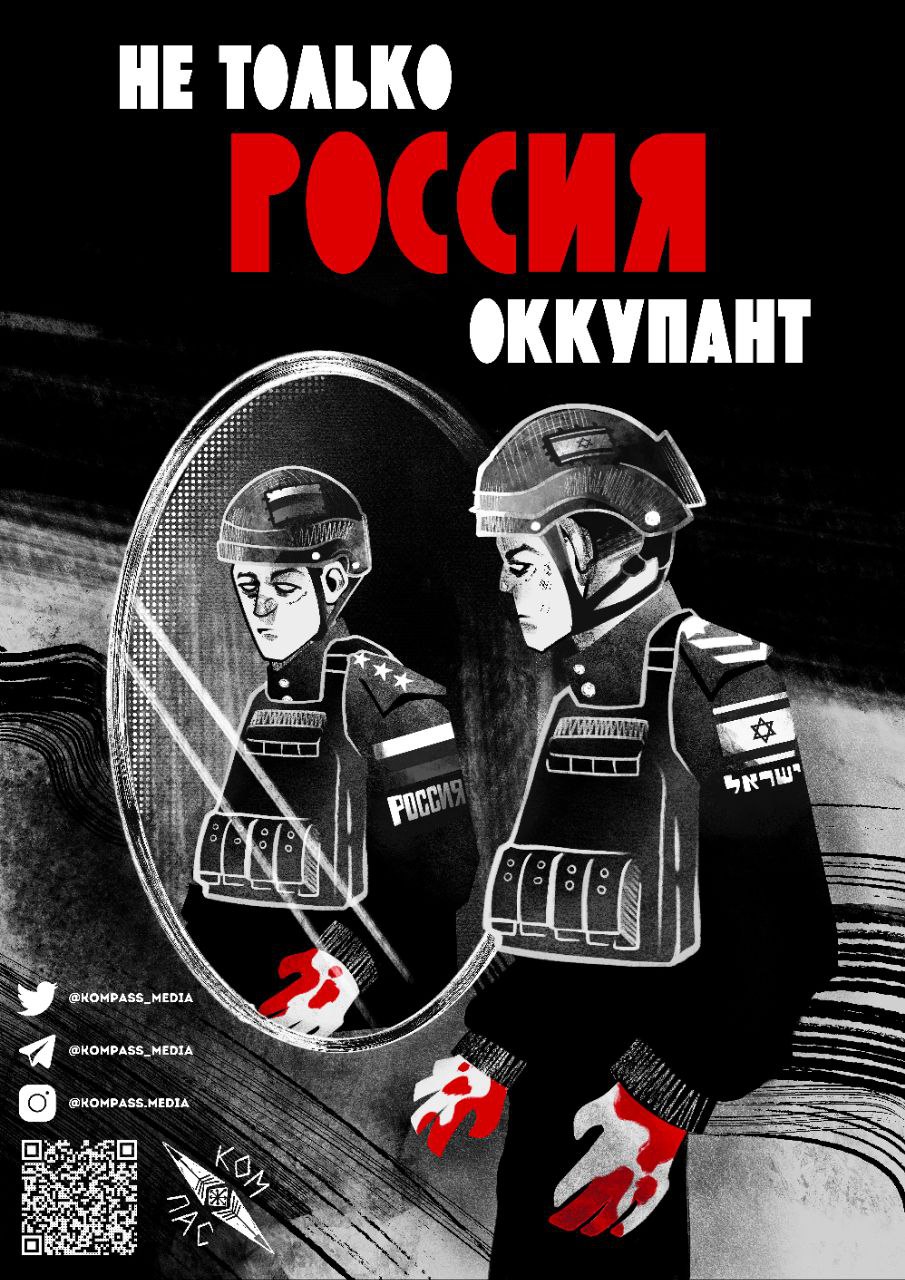
A poster created by activists of the Compass organization
But the politicisation, and the process of understanding what was happening there, started earlier. The Ukrainian Maidan has also influenced me, because it was a national uprising. I was a liberal at the time, but the problem of internationalism was important to me since I knew that I was Jewish and I was also discriminated against in Israeli society. First of all, there was a certain amount of racism against immigrants from post-Soviet countries, as they were not considered Jews at all, they were not considered Israelis, for them we were ‘rusim’, that is, Russians, regardless of whether you were from Ukraine, for example. Teachers would partially prevent us from speaking our language, explaining that we were in the state of Israel. At the same time, there was also bullying from classmates.
On the other hand, I used to visit Ukraine as a child, my whole family is from here. I grew up hearing stories of anti-Semitism. For example, how my mother was beaten because she was Jewish. In Ukraine, I was also asked: ‘What is your nationality?’ For I do not look Slavic. I didn't feel comfortable, I didn't consider myself a titular nation. There was always a feeling that you were from some kind of minority. That's why internationalism and anti-racism have always been a very important matter for me: as an understanding that you cannot be on the ‘right’ side of the wall, that the walls of racism, segregation and ethnic nationalism must be broken down.
So you did have this understanding before you joined the army?
To some extent, yes.
And did this help you understand that you were part of the occupying army?
Yes, I started to study it more deeply, because at that time I was the soldier who was travelling around the West Bank with weapons. When I saw all these checkpoints and queues, I became much more aware of what was happening there: that these people had no rights, that the entire West Bank was cut up by checkpoints and fences.
Could you please explain how it happened that it is cut up by checkpoints and fences?
In 2023, Human Right Watch recorded more than six hundred barriers to free movement. There are checkpoints everywhere. There are even mobile checkpoints: it's there today and gone tomorrow. If, for example, there is a protest or someone from a village attacks an Israeli soldier or settler, the village or town may be closed as a punitive measure.
It all started after the First Intifada [1987-1991], when the first Palestinian civil uprising took place. It was unarmed and almost peaceful for the first year. At most, maybe stones were involved. And during the first year, as far as I remember, not a single Israeli soldier or citizen was killed. The Second Intifada [2000-2005] was much more violent, and all these checkpoints were set up then, which still exist today. In general, the division into sectors A, B and C began after the Oslo Accords and was supposed to be temporary. Sector C, which makes up 60% of the West Bank, was supposed to come under the control of the Palestinian Authority five years after the signing of the agreements, but this never happened, and the situation persists to this day.
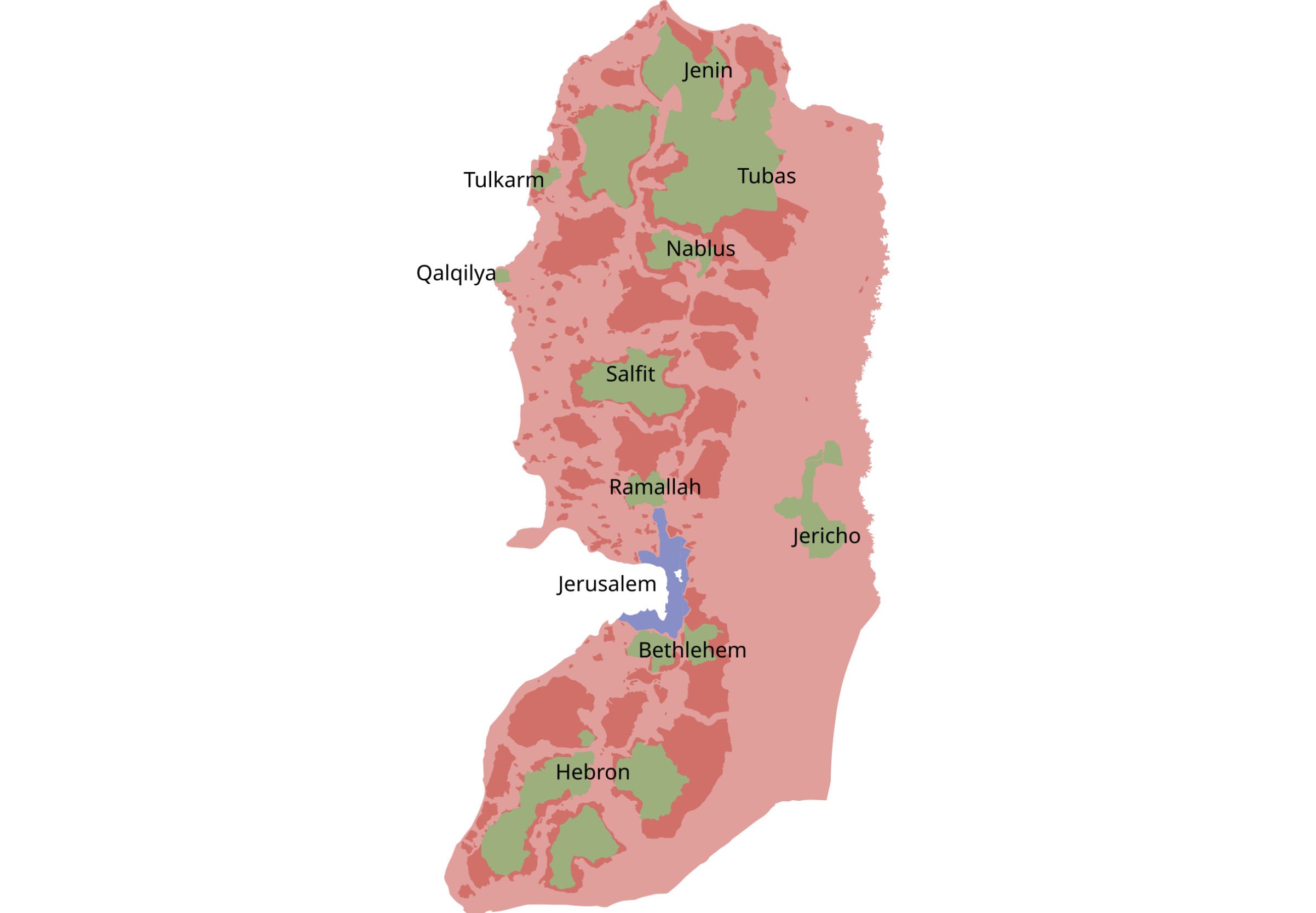
The status of the territories of the West Bank of the Jordan River according to the Oslo agreements:
 Territory annexed by Israel
Territory annexed by Israel
 Area A: Under Palestinian military and civilian control
Area A: Under Palestinian military and civilian control
 Area B: Under Israeli-Palestinian military and Palestinian civilian control
Area B: Under Israeli-Palestinian military and Palestinian civilian control
 Area C: Under Israeli military and civilian control
Area C: Under Israeli military and civilian control
So, you were a soldier in the West Bank, you saw all these checkpoints, and this is what made you take action, or did something else happen?
I wouldn't say that it was a specific event that made me decide to stop serving. Although there was one thing… the breaking point that made me leave. It happened by the time I was ordered to transport ammunition to the West Bank. Before you can start transporting ammunition, you have to be in the service for a while. I had made the decision to leave the service a few months earlier, but it was a difficult decision both for my family and for everyone. So it took some time.
However, the biggest influence on me was simply learning what was happening there – who I was in all of this, what I should do as a soldier and an internationalist in this situation. I decided that I should make some kind of an act of solidarity with the oppressed Palestinian people, and not be a part of this army at all. I wanted to deliver a public statement that it is impossible to serve in the Israeli army, that it is an occupying army that does not defend itself and Israeli society, but occupies another people. I also wanted to reach out to the huge Russian-speaking community in Israel, to whom no one shows what is happening there. To tell them: we are also part of this society, we need to do something about it, we also have a responsibility.
You publicly refused to serve, so you started looking for like-minded people? Or did they find you? How did you come to form Compass?
Prior to this, there had already been attempts to create a Russian-speaking association that would be left-wing, anti-occupation and independent of others. Probably, the understanding that this needs to be done now came after the November 2022 elections, when a far-right coalition came to power, with fourteen mandates of religious Zionists, i.e. fascists who do not hide their faces. Their plans for judicial reform, which included the abolition of the independence of the Supreme Court, also became a significant factor.
Are these people like Ben-Gvir?
Yes, but Netanyahu is also far-right.
Isn't he outwardly trying to maintain the image of a right-wing centrist?
I would say no, because the Israeli society is now so right-wing that for them the left is Gantz and Lapid, who are right-wing centrists. Religious Zionists even sometimes call Netanyahu a leftist. Netanyahu's career has always been based on the fact that he does not allow a two-state solution and rules the Palestinians with a ‘heavy hand’.
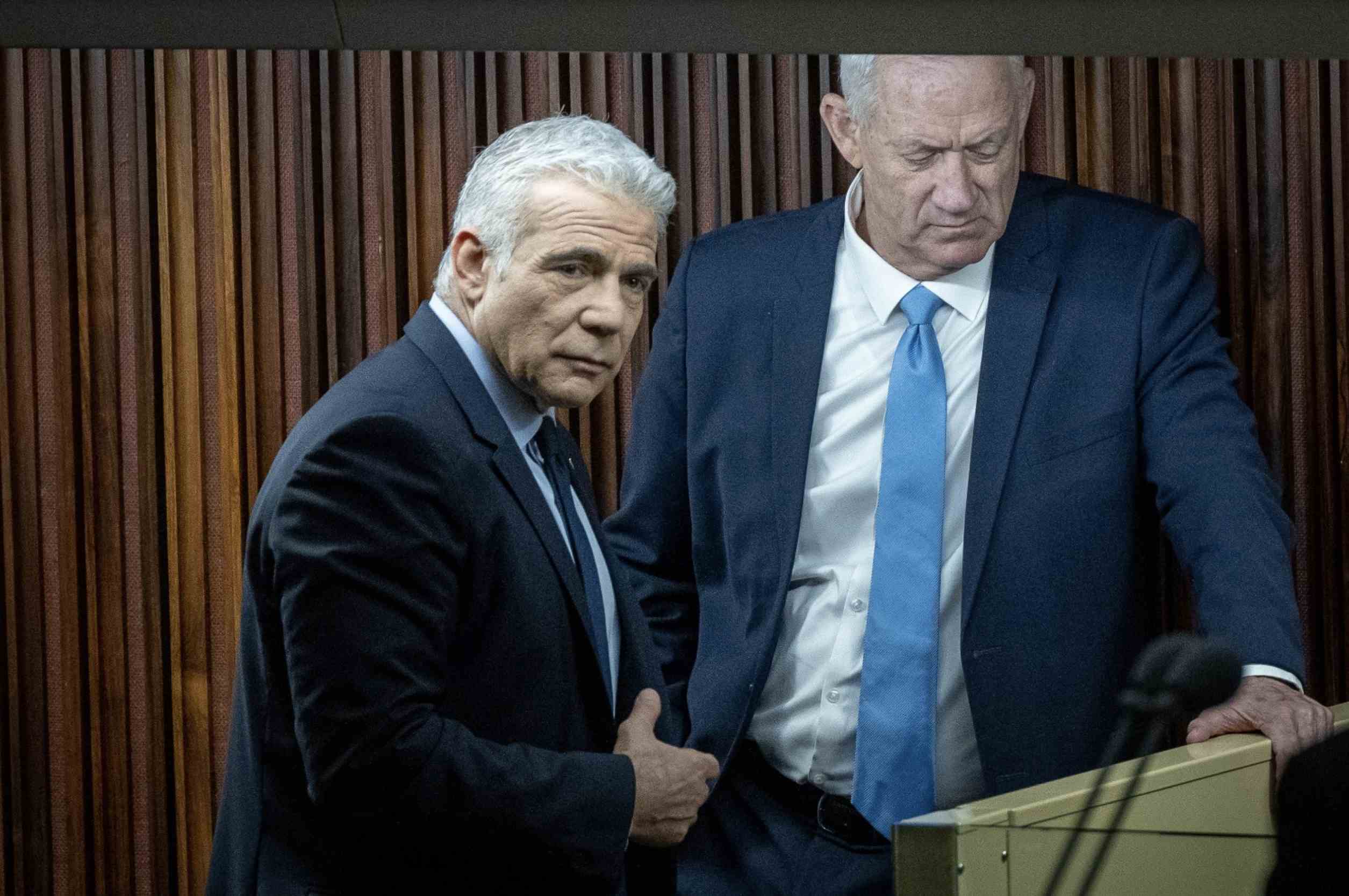
The heads of Israel's largest opposition parties, Ha-Mahane Ha-Mamlakhti, Benny Gantz and Yesh Atid, Yair Lapid. Photo: Yonatan Sindel/Flash90
And you realised that you had to start doing something after the 2022 elections?
Yes, since Russia's full-scale invasion of Ukraine, many new immigrants have come to Israel and Palestine. At the same time, there was no content in Russian that was not Zionist and that at least partially opposed the continued occupation.
How did we find people? At that time, most activists were very scattered and unorganised. I met Andrii, one of the founders of Compass, and then we found people in Haifa and started working. Though at first everything was moving very slowly: we wanted to create a magazine, a biannual paper edition, and thus create a movement. However, then I went to volunteer in Ukraine for three months, and the process was delayed. We had almost prepared the first issue for publication, and then it started…
The attack took place on the 7th of October.
Yes. And we realised all these articles were no longer relevant. I remember joking earlier that there would be a Third Intifada, and everything would go wrong. 7 October was no surprise to us. In November, we had already decided to start anyway. We launched social media, and then other activists started to join us – not as the core of the organisation, but as friends of it.
Here's a little bit about what we do. The first thing is the content on what is happening in Israel-Palestine not from the point of view of Israeli propaganda. It's about what Israel is doing in the West Bank; about the fact that Israel is not a democracy, but an apartheid regime from the river to the sea; about how to solve all this. And the second thing concerns what we do as individual activists, which is that we try to involve other activists and citizens into this process: it's a left-wing activism in the West Bank. It consists of a protective presence.
There are Palestinian villages that are constantly under attack by settlers and the Israeli army. Israeli and international activists are mostly working in this region, in particular in Masafer Yatta [19 Palestinian settlements in the southern West Bank – ed], the southern Hebron Hills and the Jordan Valley. The Palestinians ask us to come because our presence can reduce the level of violence by settlers, since we film, document everything and share information with international organisations and society. We also try to engage the police to stop crimes, but this usually doesn't work because they protect the settlers and arrest Palestinians.
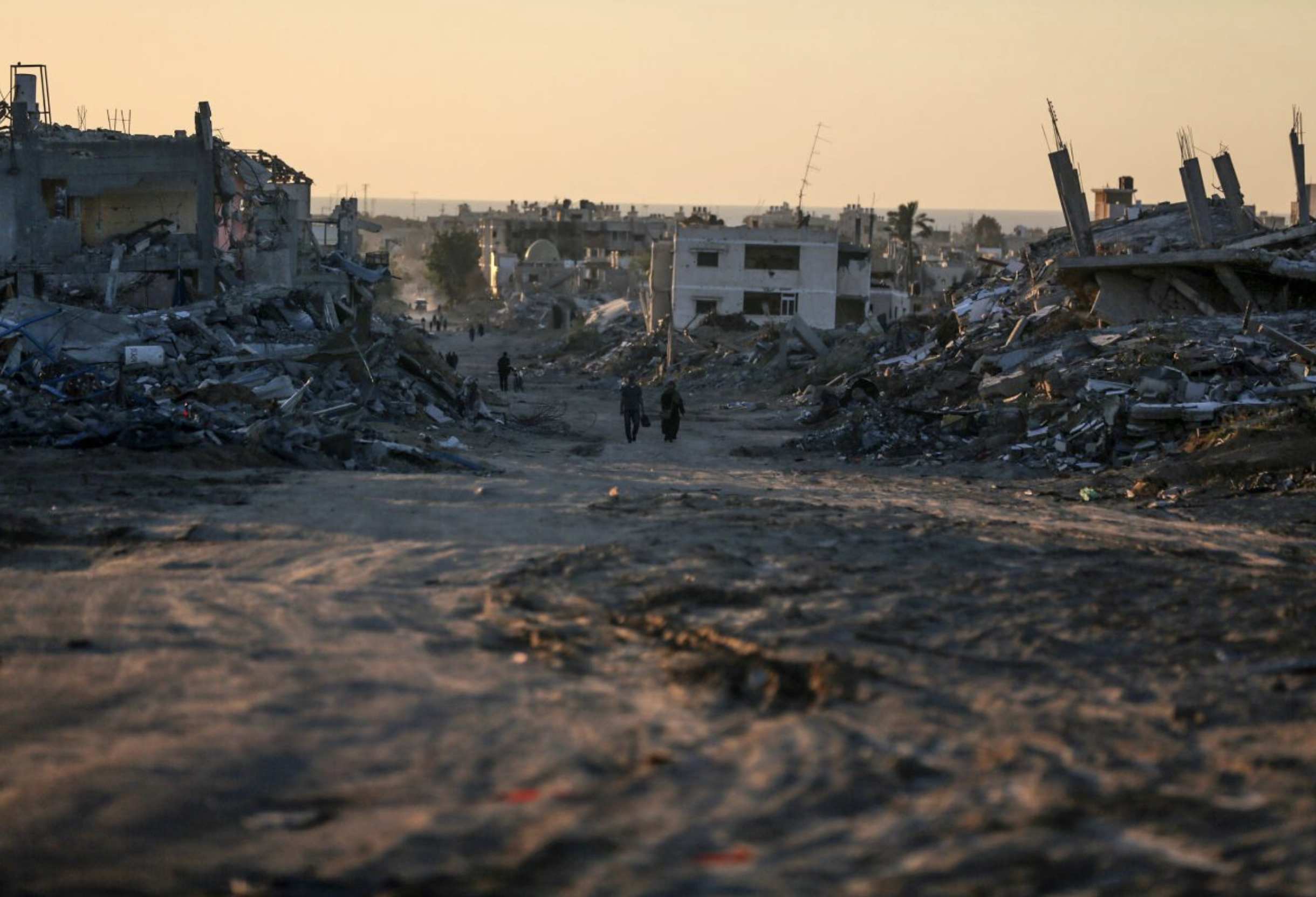
The aftermath of the bombing of the town of Khan Younis in the southern Gaza Strip, May 7, 2024. Photo: Majdi Fathi
For this is the main policy towards the occupied territories.
Yes, and we need to show it. And we need to try to mitigate it with our presence.
I also saw some posts regarding protests on your social media, can you tell us about them?
Our first street action was when we put up stickers saying ‘No to the Israeli occupation’. Then Navalny died, and Russian liberals came out to the embassy, although they were not organised. We came there with a megaphone and started shouting the slogan ‘From Ukraine to Palestine, all occupations are criminal’. Of course, they wanted to kick us out of the protest. It was the first successful action, and the video of it went viral.
The second action took place on the 24th of February 2024: we doused the Russian embassy with red paint. And perhaps one more protest: we spread posters ‘Not only Russia is an occupier’, and since Israel is completely silent on this topic, it caused an explosion in the Russian-speaking space. We started receiving numerous threats. The main attack on us were allegations that we were Russian immigrants, and instead of fighting against Putin's regime, we were fighting against Israel. I then recorded a separate speech in Ukrainian, in which I said that we are Israelis, that we are fighting against both the Putin and Israeli regimes.
While we're talking, you mention the Russian-speaking audience a lot. Here in Ukraine, it's a very important thing right now to distinguish Ukrainians from Russians. And until 2022, in Israel, all Ukrainians, Belarusians, Russians, Kazakhs, and Caucasians were mostly called ‘Rusim’ or Russians. I got the impression that after the 24th of February the situation began to change. The Ukrainian communities emerged, as did the Belarusians, who started to create their own organisations. Did this have any impact on your activities? Your pages are mostly in Russian (although I have seen a few posts in Ukrainian). Did you somehow work this out within the organisation, and did you talk about it with each other after Putin's aggression began?
We use Russian as a lingua franca for everyone to understand. We have to do this because the society of immigrants from the post-Soviet space in Israel is very Russified. This is also a problem, but we do not aim to solve it, because our main goal is to highlight and combat human rights violations by the Israeli regime. At the same time, we are not addressing Russians exclusively – we are addressing everyone. It was very important for us to emphasise our opposition to Russian imperialism. This is what we did at the rallies near the Russian embassy, and in one of our texts we listed the nationalities that are currently under Russian colonialism.
I know that when it comes to comparisons between Russia and Israel, people often say that Ukraine has never attacked anyone, has never committed massacres as HAMAS has. What is your response to this?
Firstly, the horror that took place on the 7th of October did not begin on that exact day.
[the editorial board of Commons condemns HAMAS violence against civilians on the 7th of October 2023]
The Israeli occupation regime has been violating human rights since 1948. At that time, 750,000 Palestinians were expelled, accounting for 75% of the population. After the occupation, Israel imposed martial law on Palestinian citizens, which lasted from 1948 to 1966. Since the occupation of the West Bank and Gaza Strip began, protesters have been shot, violations of almost all human rights have been committed, and the settlement colonisation of these lands has continued. For example, in 2014, Palestinian militants kidnapped and killed two Israeli settlers. In response, Israel invaded Gaza and killed 2,500 people. 60-70% of them were civilians, including more than 500 children. This is one of the examples that this did not start on the 7th of October. The people who participated in the attack on the 7th of October are people whose parents, children, brothers, sisters were killed by the Israeli regime. There is a very famous photograph from the Second Intifada, when a Palestinian boy throws stones at an Israeli tank in the Gaza Strip. Three days later, he was shot dead. And now those same children have grown up and come to take revenge. And it will happen again…
If it continues…
If the occupation continues.
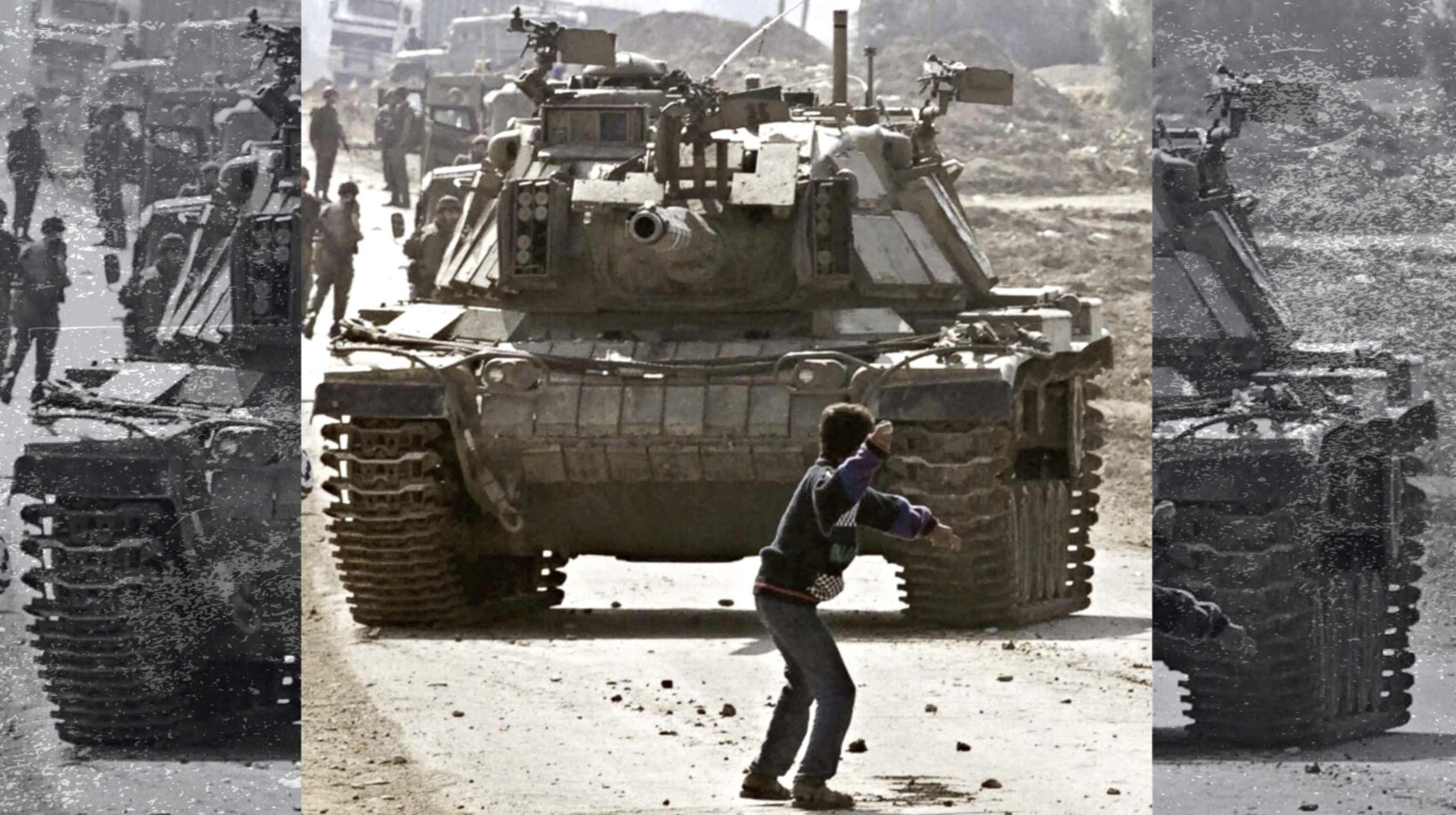
Faris Odeh became a symbol of Palestinian resistance thanks to a photo of him throwing a rock at an Israeli tank during the Second Intifada. In November 2000, he was killed by Israeli forces near the Karni crossing while throwing stones at them
You may be accused of justifying HAMAS. Is that true?
I don't think it's justification, it's taking into account the context. The Gaza Strip is not even a state and according to international law that is not the same as Russia's invasion of Ukraine, where one is dealing with an international conflict. Under international law, the Israeli invasion and the 7th of October attack is an internal conflict, because most international organisations consider Gaza and the West Bank to be occupied territories. I do not believe that this is a justification. We need to look for the cause, otherwise it will just keep repeating itself.
There is another argument that is often used: Israel withdrew from the Gaza Strip at some point of time, and many consider this to be a de-escalation attempt, while the Palestinians, on the contrary, are committing terrorist acts. How do you respond to such allegations?
Firstly, although Israel has withdrawn ground forces and settlements from the Gaza Strip, most international organisations consider the occupation to be ongoing: Israel continues to control the air, land and sea borders, it has effectively imposed a blockade on the entire city. There is also the Rafah Border Crossing, which is controlled by Egypt, but nothing passes through it without Israeli permission.
And how is this ensured, how does it work, could you clarify?
It's an agreement with Egypt, however, for example, when, after the 7th of October, some humanitarian aid was attempted to be brought in from Egypt, Israel started shelling the Rafah Border Crossing. Yet this was after the 7th of October, but in general, the Egyptian regime cooperates with Israel, so there is no need to use force.
Israel also controls telephone lines, the Internet, population registration – it has control over almost everything. Except for garbage collection. That's why the Gaza Strip is not an independent state; they don't consider themselves as an independent state, they consider themselves as an occupied territory and part of the whole of Palestine.
I also recall now that Ariel Sharon spoke about the demographic problem of Gaza and that it was in Israel's interest to withdraw. This was not an act of de-escalation, Israel simply moved from controlling Gaza from inside to controlling Gaza from outside.
But what is the demographic problem?
The demographic problem is that there are 14 million people living in the entire territory of Israel-Palestine, and half of them are Palestinians. Israel needs to make sure that the Palestinians do not become a majority in the Knesset.
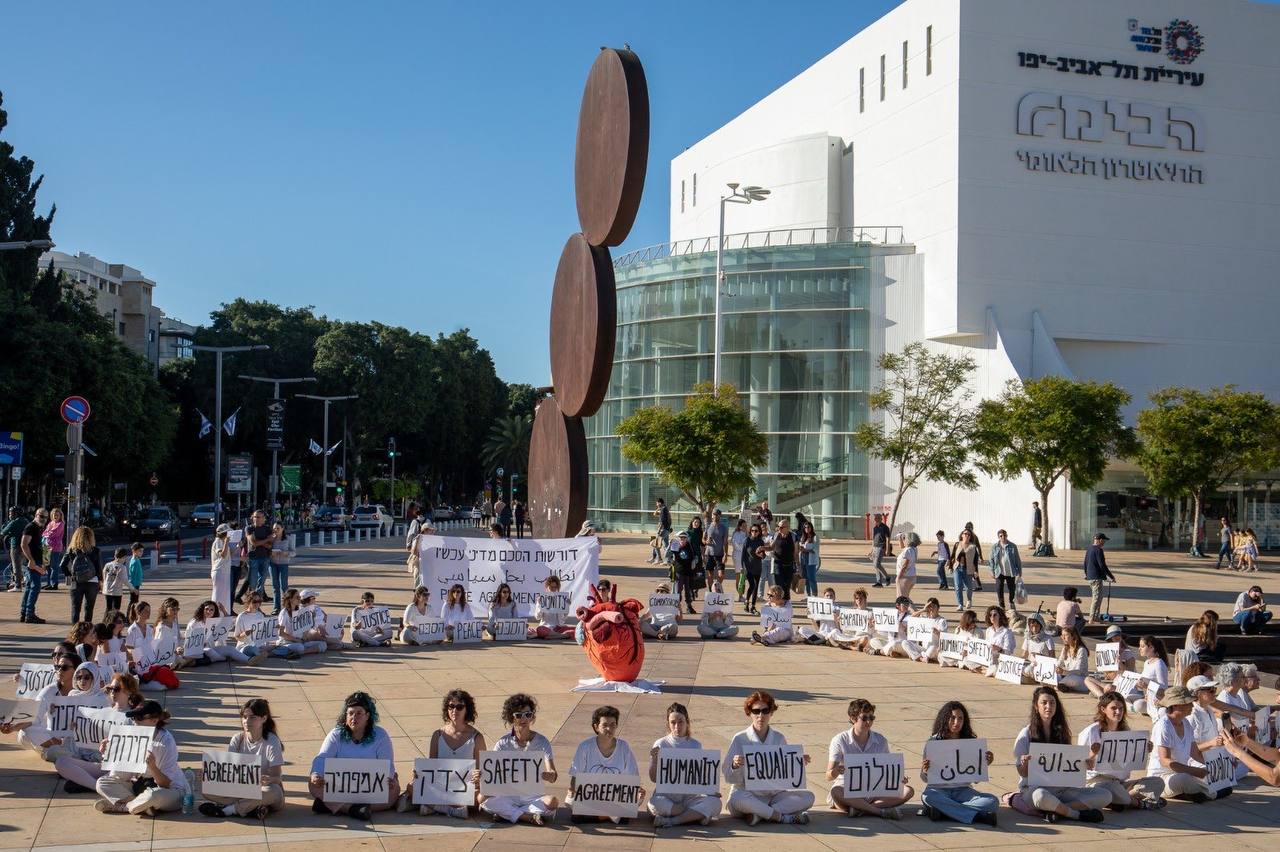
A joint anti-war action by Jewish and Palestinian women in Habima Square in Tel Aviv on December 15, 2023. Photo: "КОМПАС" Telegram channel
Let's return to the Russian-speaking part of the Israeli community. I read in an essay by Adi Kunstman that the main problem is that a significant number of Russian-speaking Jews in Israel were born in the USSR, where people were often relocated from one republic to another. They brought this knowledge to Israel, and it seems to them that you can simply relocate Palestinians from state to state, that it makes no difference to them where they live – in Lebanon, Jordan, Syria, Egypt. And this leads to such appeals, saying, let the fellow Muslims help one another.
I have two questions. The first is whether you notice such thoughts among people from the former Soviet Union in Israel. And second, if you work on this, how do you respond to such appeals? I think it is easier to explain this in Ukraine, because here the land is also important to people, but in Israel it may be more complex, in my opinion.
Firstly, yes, I have noticed this, and it can be different. The repatriates of the 90s had an immigrant syndrome that led them to support any actions of the state. However, many people simply did not know what was happening because the media did not report on it. Now there is one Russian-language channel, Channel 9, which covers the events in the occupied territories only from the point of view of Israel. For those born after 1991 (including me), the choice is essentially this: either forget your culture and fully integrate into society or remain marginalised. Many people are trying to integrate, and in this context there is a similarity with the statement from South America: ‘’more Catholic than the Pope‘’. Here, it's the same story: many people are trying to be bigger Zionists than Ben-Gurion or Ben-Gvir.
Let's move on then to the second question: what should one say to people who think that one can simply resettle those whom they consider Arabs to any other Arab state?
Firstly, we are addressing young people, not those who immigrated in the 1990s. For young people, the USSR is just a history. People don't understand this context, so we are trying to explain that these are not just Arabs, with Arabs being divided into nations, just like the Slavs – there are different Slavic nations, not a single pan-Slavic community. Ukrainians belong to a separate state with their own land. Similarly, Palestinians with their own land, while surrounded by Syrians and Lebanese, are still other separate states. They may have a similar culture, but they are different peoples.
People may respond to such explanations by saying that ‘Arabs’ have the same language. I was also told that there was a project to divide those lands into Israel and Transjordan, which proves to them that there was no Palestine.
First, the main answer comes from Palestinian society itself: they always say that they are a separate nation with a separate culture and history. It's about the right to self-determination.
And you also have to understand that it is easy to talk about all these details in Ukraine. But in Israel, our main goal is to create this discourse and these discussions, because in Russian-speaking society this debate is almost non-existent up to now. We want people to hear about it.
I think it was important to say this because people here don't realise how difficult it can be to talk about such things in Israel. People here still believe that it is the only democracy in the region.
From what I know, the vast majority of Israelis support the occupation policies. Some people consciously want this to happen, others just don't know or don't believe in what the settlers are doing under the cover of the army and police. What do your family and friends think about your activities? Does it go along with your family values or does it contradict them?
We are from the Russian-speaking part of society, and almost always this has to be in a contrary way. Among Hebrew-speaking activists, many have relatives who are activists, leftists, but this is not the case among us. After my dismissal from the army and my activist position after the 7th of October, I am no longer in contact with most of my childhood friends. They have a very right-wing, pro-Israeli position. My mum doesn't like what I'm doing either, but after talking to me, she understands better what's going on. When I go to the West Bank, she worries that something will happen to me, either because of the soldiers or the settlers, and she already understands that something is wrong there. But for her, it is important to support the Israeli regime because of the immigrant marginality I mentioned earlier. Such people are afraid to express any protest thoughts.
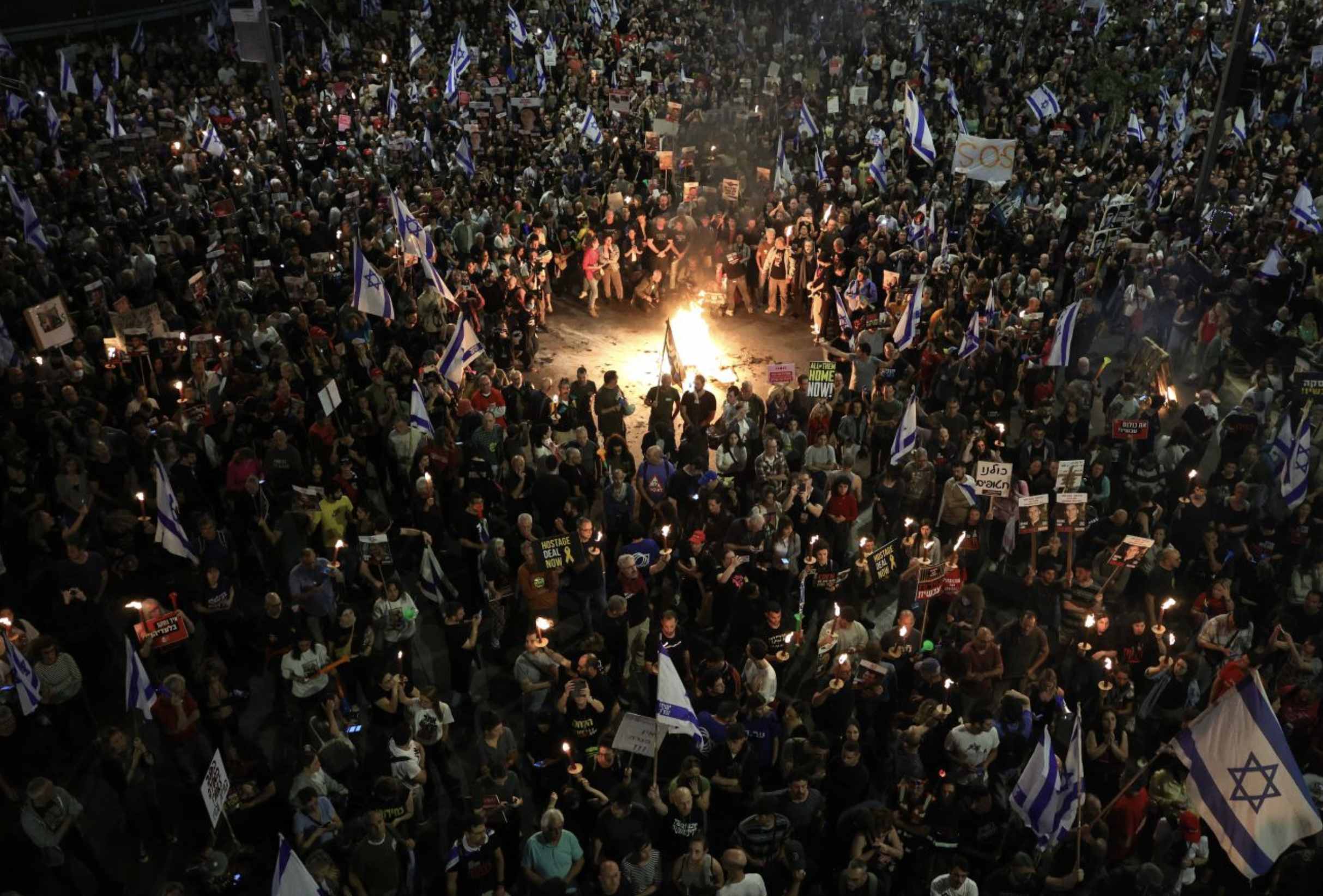
The largest demonstration in Tel Aviv since the beginning of the war. Families of hostages taken by Hamas terrorists join the opposition demanding the resignation of the Israeli government on March 30, 2024. Photo: Abir Sultan
However, you say that your activities helped your mother, for example, to understand at least to some extent that some wrong things were happening there.
Yes, it did.
It is important. So, do you still keep in touch with your family?
Yes.
It is also interesting to hear about the state's position regarding your activities. Do they allow you to protest freely, to speak freely on what concerns you?
Let me remind you that there is an apartheid regime between the river and the sea, and the sanctions of this regime depend on the ethnicity of the person. We, as Jewish activists, are even anti-Zionists, and we have hardly been sanctioned, even after 7th October. I'm sure that left-wing activists are monitored by the secret police, for example, through wiretapping, but no arrests are made against us, in contrast to the ones they make against the Palestinian population.
For example, my Palestinian friend, Yusuf, published pro-Palestinian posts after October 7. He very soon received a call from the secret police and was told: ‘If you continue this, we will take you and your mother away’. He was forced to emigrate to Canada and seek asylum.
Another example, which we also recently covered in a video, is Rasha, who owns a beauty salon. After she condemned the killing of babies in Gaza on social media, the police came to her house, put a blindfold on her eyes and took her away. She was released only after the incident was caught on video and reached the international community.
In the West Bank, since the 7th of October, there have been 6,200 administrative arrests without trial, without a lawyer, and with a term of up to six months.
So, you specifically don't face any obstacles?
Oh, I have just remembered! After the 7th of October, there was a month when it was prohibited to hold any anti-war demonstrations at all. We were arrested in Tel Aviv near the police station during a protest in opposition to the arrest of members of the Arab Higher Monitoring Committee, who encouraged people to protest. Everyone was illegally detained there. But this is no longer the case. One more thing happened: they arrested a teacher who published on his page photos with stories of children who died in Gaza with the intention of sentencing him to 5 years for treason. However, after this case received international publicity and after protests from the Israeli left, the case was suspended.
What about the Israeli left – is it Meretz or whom do you refer to?
No, no, no, it's not the Zionist Left, it's the anti-Zionist Left in Jerusalem.
Are these low-level organisations?
Yes, it was Voice Against the War and Free Jerusalem.
I think it was during Netanyahu's term, a few years ago, that organisations that fought for human rights were declared terrorist.
This did not happen during Netanyahu's tenure. It happened when Lapid became prime minister, after a rotation with Bennett, that is, before the last election. Back then, when Gantz was defence minister along with Lapid, they declared Al-Haq, one of the oldest Palestinian organisation, a women's organisation, a peasant organisation, and Palestinian human rights organisation as terrorist. The offices of this organisation were sealed.
So, it applies only to Palestinians? Doesn't the so-called ‘B`tselem’ fall under this?
No it doesn't. This is something they want to do, but it's not there yet. Anyway, let's not forget about the apartheid regime. In Israel, relative democracy can exist only for Jews, while for Palestinians, including Palestinian citizens of Israel, there is a dictatorship. An Instagram post can lead to administrative arrest without trial, even if you are a citizen. Meanwhile, I constantly publish anti-Israeli posts, and no one from the secret police knocks on my door.
I saw that you cover your face at some of the rallies.
Yes, I do.
Then why do you do it?
For the most part, we don't do this at Compass, but sometimes it can happen because of anonymity. You may get bugged, for example. Also, right-wing organisations may engage in doxing[1] and persecute left-wing activists.
This is often the case when these organisations cooperate with the secret services, so we might assume that this is also part of the state policy.
Yes, of course.
Similarly, it seems to me that in the occupied territories, soldiers are less likely to directly conflict with Palestinians when compared to settlers who do so all the time. The soldiers might be at their side, ‘protecting’ them.
It depends on where. Almost every week there are military raids that take place during which extrajudicial executions are committed, which Human Right Watch has also defined as unlawful killing, and this is happening all the time.
This is something I often remind my opponents of: that until the 7th of October 2023, more than 200 Palestinians were killed, including children and journalists.
It was 150 or thereabouts in 2022.
Sometimes people in Ukraine can't quite believe me. When the journalist Shireen Abu Akleh was killed, it was followed by the police beating with truncheons the funeral procession including the people carrying the coffin. Once I show this video, people often stop talking because they realise that something is really wrong.
Yes, it was a terrorist attack. I have another example: in 2018, the shooting of the demonstrations in Gaza known as the Great March of Return. In Gaza, 80% of the population are descendants of the 1948 Palestinian refugees, and they remember where they came from, they remember their villages. These were peaceful Friday marches. Palestinian women demanded the right to return to the lands from which they were evicted as well as the end of the blockade on Gaza. And this march was shot by the Israeli army: 223 people (46 children) were killed and 9204 injured. The marches lasted from the 30th of March to the 11th of May. During this time, not a single Israeli was injured.
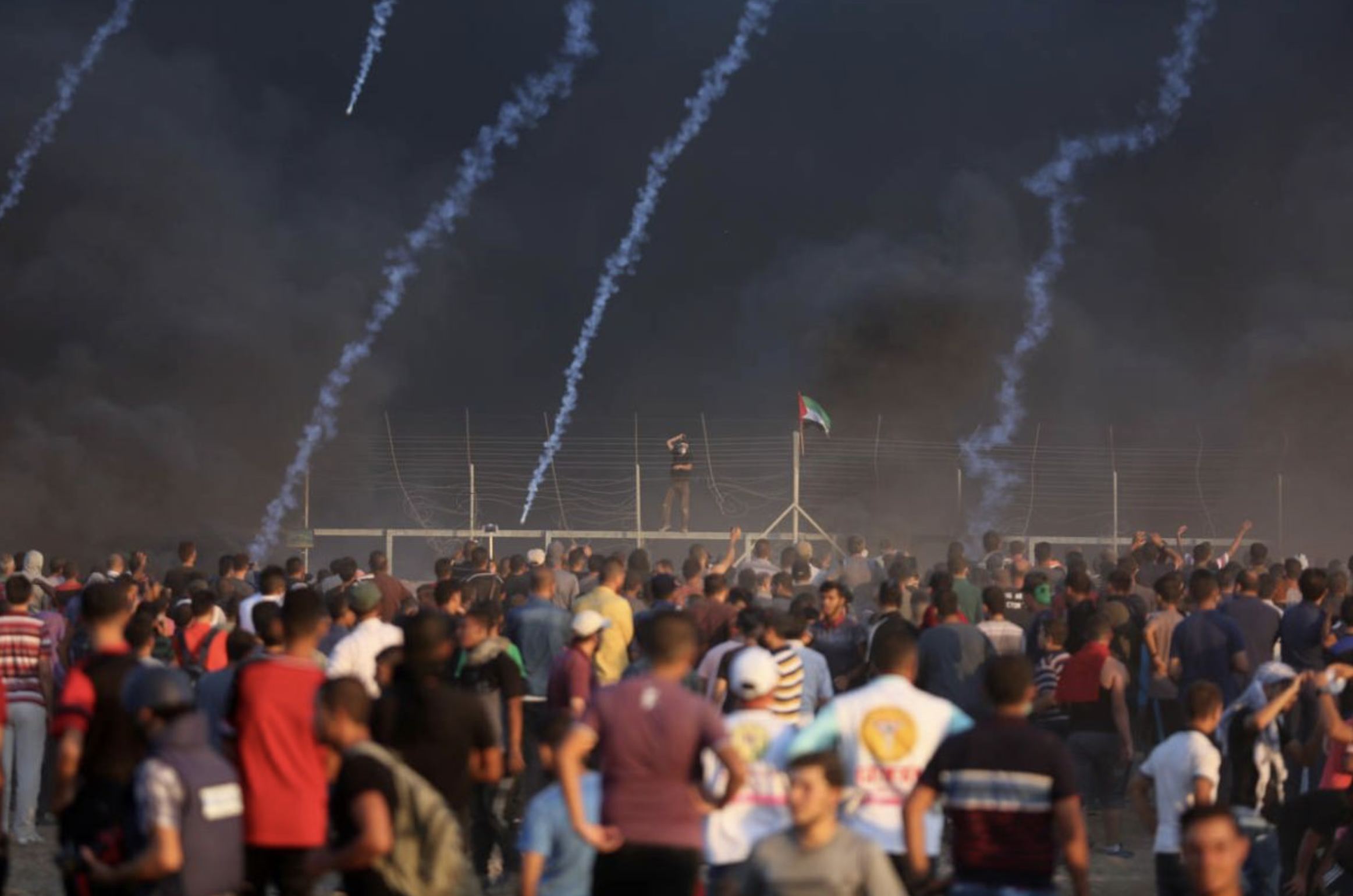
"The Great Return March", March 30, 2018. Photo: Mohammed Zaanoun
We talk a lot about the men and women of Palestine, so it's important for me to ask: do you cooperate with Palestinians? Can you feel that they see some common goals that you and they share, some common understanding of what to do in the future?
As activists, when we go to the West Bank, we work with local Palestinian activists. So everything we do in the Jordan Valley is determined by whether our actions will help the Palestinians who live there.
And you ask whether they really need this kind of help?
Yes. There are groups of Palestinian activists who are always discussing what to do.
What is the reaction of activists and ordinary people regarding your presence there? Do you talk, do you share opinions? Is it just your presence or is it cooperation?
Firstly, we understand that we are guests there. There is no council that decides what we are going to do with them. We are rather focused on short-term solutions, because the attacks on the Palestinians never stop. The long-term solution at the moment is probably to engage more activists on both sides in the Jordan Valley and expand the movement to other Palestinian communities. The Palestinian Bedouin are a very marginalised society, and they need to organise themselves to counter Israel's actions.
Do you cooperate with other anti-war organisations in Israel; are you trying to expand your network in any way?
We cooperate with the Radical Bloc, a Tel Aviv-based association of anti-Zionist activists who organise protests. We also cooperate with Mesarvot (?????? – ‘We refuse’), and I myself used this organisation to refuse to serve. If there is a protest in support of conscientious objectors, we always try to be there. When something happens in Jerusalem, we also cooperate with Free Jerusalem.
I'd also like to know if you are only engaged in activism, or do you work and go to the protests in your free time?
Of course, we work, since we get no money from our activism. We are not professional journalists or activists who receive any money from their activities. We combine our activity with work. In Israel, you have to work hard to make a living.
But we have one activist, Andrei, who decided to live in the West Bank. He has been there for three months. So we can consider that we have one full-time activist. The locals gave him shelter because they understand that his presence helps. I'm thinking of doing the same, but in a different place – in Masafer Yatta. There, if possible, we have to work in shifts, and whenever we arrive, they always find a place for us to stay.
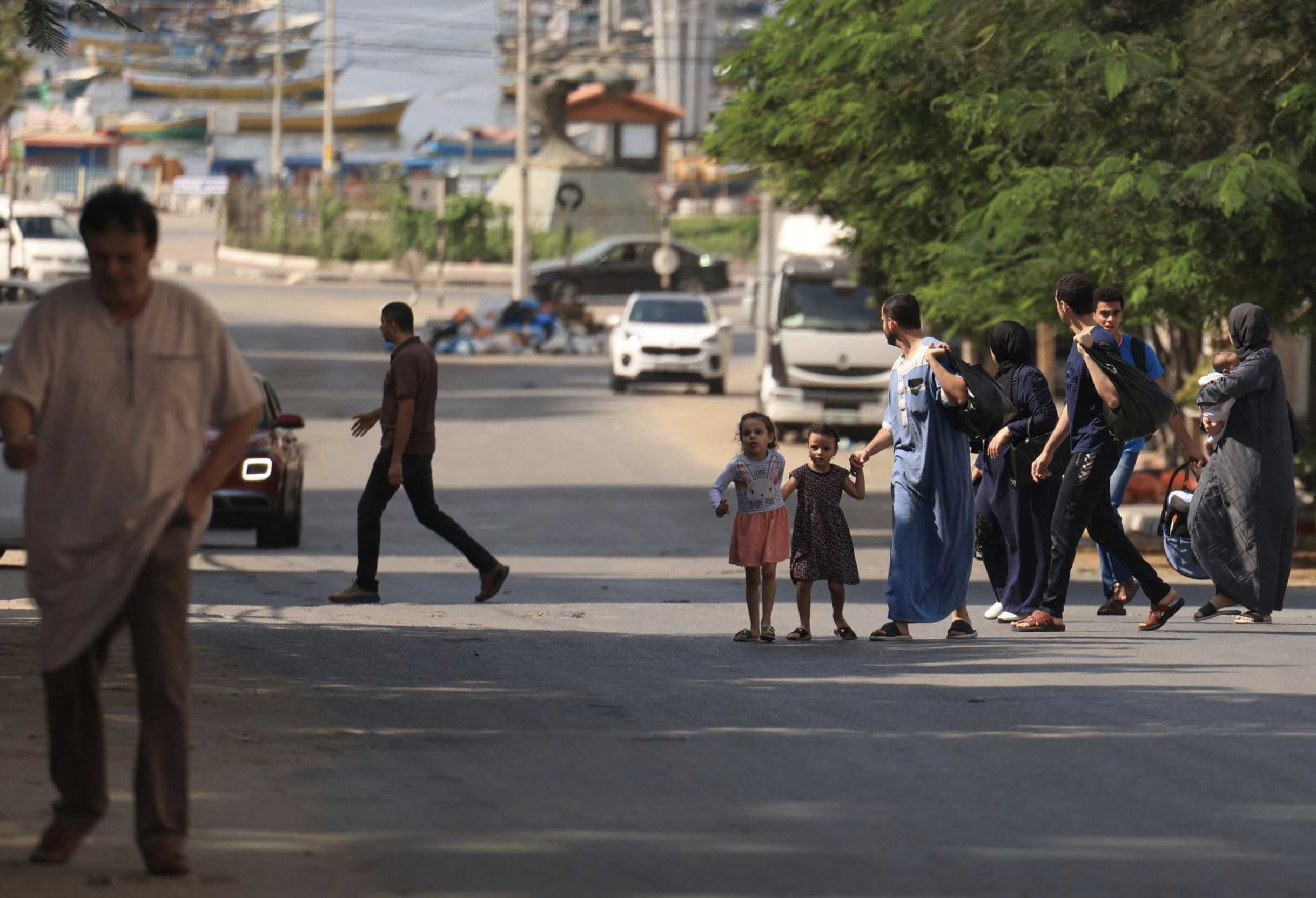
A Palestinian family moves to a safer area after a night of shelling in Gaza. Photo: Mahmud Hams
Do you find any class reasons for Compass? A class basis for what you have created. Do you notice that these are, for example, people from working-class families or middle-class people who want justice?
I would extend this question to all anti-Zionist activists. Our movement is independent, but it is an intersectional struggle, and we are part of the anti-Zionist movement as a whole. The anti-Zionist movement is very diverse. People from the upper class had the opportunity to get an education and get more information. In Israel, unlike in Ukraine, there is only private education, and the culture there is very class-based, because the access to culture and information is very class-based. If you come from a marginalised part of society, you will only see violence and right-wing propagandists, and you will grow up with that.
If we talk about left-wing Zionists, they are mostly of Ashkenazi origin. Ashkenazim are Eastern and Central European Jews who were the first to immigrate to Palestine. They own the most property and tend to be more economically stable than Ethiopians, Arab Jews, or immigrants from the former Soviet Union. Anti-Zionism, on the other hand, is much more scattered. In the 1960s, there was a movement called the Black Panthers. In Israel, the Black Panthers were Arab Jews who fought against racism towards themselves, yet they were also anti-Zionists.
Can you explain who you refer to as Arab Jews?
In Israel, they are called ‘Mizrahi’ (??????), which means ‘Easterners’. These are Jews who immigrated from Yemen, Iraq, Egypt, and Morocco where there was a huge Jewish community.
So, you don't notice any kind of movement based on classes?
I would say that these are people with an access to information, culture, education, who have a better chance of becoming activists. If in Ukraine a person goes to university after the age of 17-18, in our country people this age mostly go to the army, where they are heavily indoctrinated, and afterwards only a part of them go to university since it is very expensive. And if a person comes from a poor family, he or she will most likely not be able to go to university.
Despite this, Compass members are mostly from the working class. There are activists from the more privileged strata of the working class, but there are also people from very poor families. At the same time, we need to understand that even the most marginalised of us are privileged in relation to the vast majority of Palestinian women and men.
You said you are less of a long-term thinker, but do you have at least a rough idea of what you want for the lands of Israel-Palestine in the future? Where should we move and with whom? Should we move simultaneously with the Palestinians or together with them? Should there be two states or one for all?
Yes, we are taking into account the long-term issues, but we also understand that the decision should not be made by Israeli society. In 1948, the most important Zionist organisations created a racist regime that has lasted for 76 years. The Israeli regime is determined to ask only Israeli society, while Palestinians in the West Bank, Gaza, and Palestinians living within the 1948 borders have no voice and are very marginalised. Therefore, we understand that it is very important to spread the word worldwide in order to create international pressure on Israel to negotiate, withdraw from the occupied territories or create one state for all. We must also not forget about all the refugees who are unable to return home.
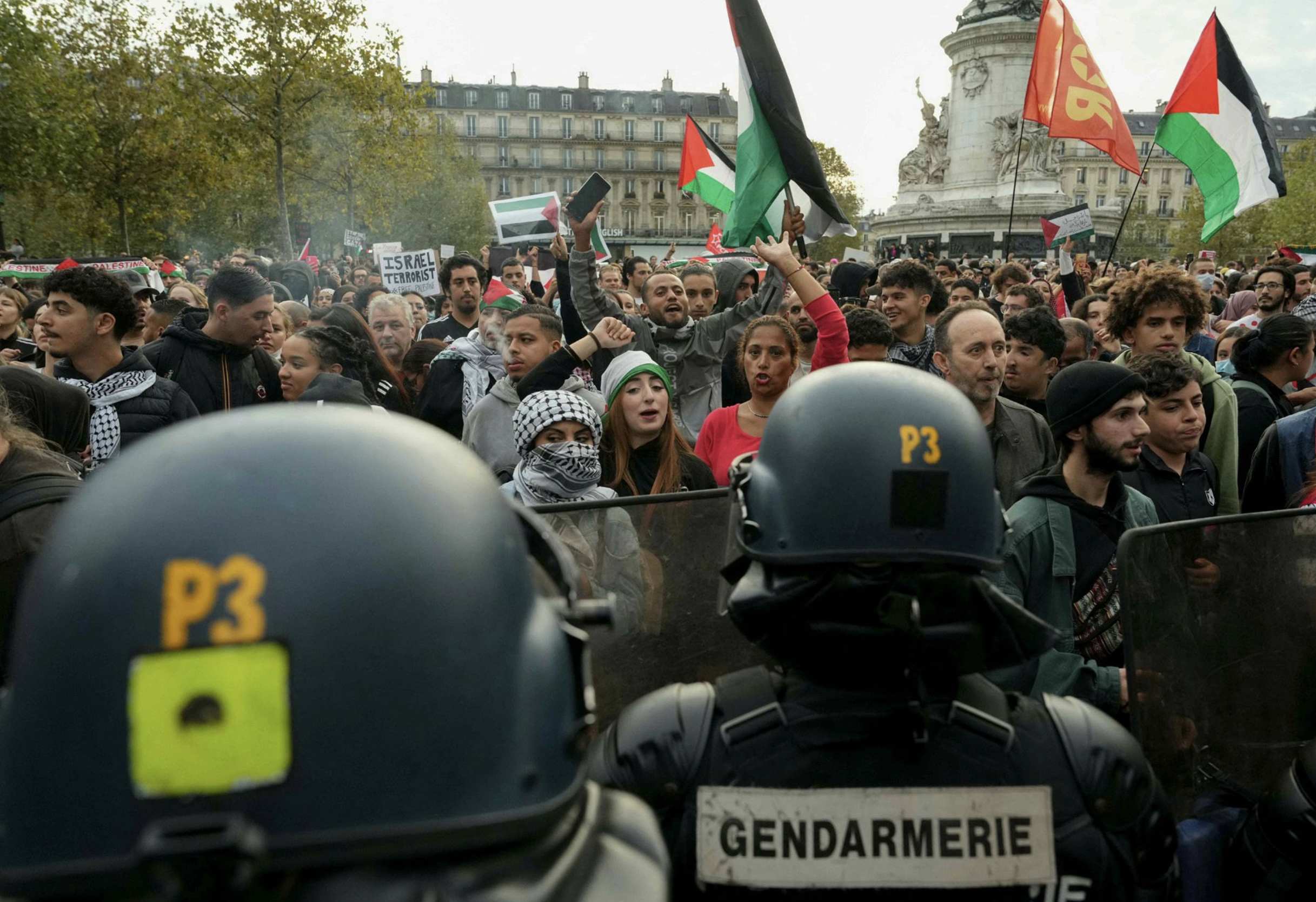
Supporters of Palestine clash with French gendarmes on the Place de la République in Paris during an unauthorized demonstration on October 12, 2023. Photo: Dimitar Dilkoff
Are you talking about the right of return?
Yes, this is one of the most important matters. In Gaza, 80% of the people are refugees since 1948, there are also many refugees in the West Bank, and throughout the eastern Mediterranean. Whether it's one state or two – firstly, the apartheid regime has to end, as one state simply deprives people of other ethnicities of their rights. The checkpoints must be destroyed. We talk on whether there should be two states or one, but in fact there is already one state. In fact, Israel has already resettled 700,000 settlers and built settlements to isolate Palestinian towns and villages into separate enclaves. There are currently about 160 such enclaves in the West Bank. And there is no political force capable of evicting the settlers who moved in after 1967. If there are going to be two states, one of the most important issues is the issue of settlements, because they are illegal.
This solution must take into account the interests of both Palestinians and Israelis. Because the Jewish population of Palestine is not going to disappear. Although some may emigrate if there is no Zionism, a certain number of Jews will definitely remain on this land. However, what matters to us is to stop the regime of occupation and apartheid. We are less interested in how many states there will be.
So, you also find it difficult to answer, and the main thing is to try to stop what is happening now.
Yes, and that's why the most important thing now is international influence that will put pressure on the Israeli regime in order to end the occupation. Israel will most likely not agree to a one-state solution, because if this state is truly democratic, it will mean the destruction of the entire Zionist project. Even now, there are almost equal numbers of Jews and Palestinians in Israel-Palestine. But there are also refugees. Therefore, the Zionist project can only continue to exist in the same way as it does now — through apartheid.
Do you also consider the risks that Jews may face if the current Zionist state falls?
In Gaza, polls were conducted regarding people's views on the two-state solution and on HAMAS. The majority of respondents spoke out against military violence and supported a peaceful settlement of the conflict. One should also understand that in the context of not only the Palestinian conflict, but historical cases of colonialism, such as the French occupation of Algeria, violence by indigenous populations is often a response to violence by colonisers or settlers.
This is a very important point, but there is still a difference between the situation in Algeria, where France was an external occupying power. They suffered to a certain extent from the uprising, but they could leave afterwards. In Israel, there are 7 million people who have been living on this land for generations and sincerely consider it theirs. It is unlikely that they will leave.
The vast majority will not leave. It is important to ensure a peace process that takes into account the interests of both Palestinians and Israelis. That's why I said that violence by the indigenous population is the result of colonial violence. If colonial violence ends and a system with equal rights and democratic expression is established (which does not exist now), then the majority of reasons for violence will disappear.
There is a lot to be discussed here, but let's leave it up to the readers. I would like to ask about the overall feeling in your organisation. When talking to each other now, do you believe that the goals you set are achievable? Or rather, do you simply continue to do it, since you cannot do otherwise?
I think the answer is yes in both cases. We understand that either way we will not be the main force that will cause things to move in the right direction. We also understand that it is our responsibility as citizens of this country to do something. It is important for us to try to do something in order to stop Israel's crimes here and now, regardless of the outcome.
We also understand that this is only a part of the way. Our main goal now is to open this discussion. There is already a discussion in English, Hebrew, and Arabic, but it is almost non-existent in Russian. It was hard for me to find information on it. We are trying to make it easier, so that, as they say in Hebrew, ‘this subject is always on the table’. And I think we are achieving this goal quite well. These are no longer just the arguments of some, as we say, ‘anti semites abroad’. It is us, Israelis, and we understand that what is happening has to stop if we want a peaceful and just life.
Footnotes
- ^ The practice of collecting and publishing personal or identifying information about a particular person or organisation.
